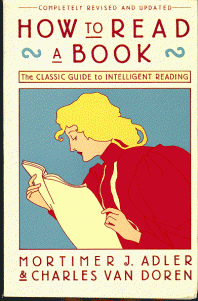Read a book slowly, but mark like crazy!

What to do if a friend wants to borrow a book? You firmly but gently tell him to buy his own copy. “You will lend him your car or your coat—your books are as much a part of you as your head or your heart.” Put another way, a marked book is “a kind of intellectual diary, and lending it is almost like giving your mind away.”
This sage advice is offered by Mortimer Adler in a short article entitled “How to Mark a Book.” He goes on to argue that a book is not fully owned until it is properly marked.
Full ownership comes only when you have made it a part of yourself, and the best way to make yourself a part of it is by writing in it. An illustration may make the point clear. You buy a beefsteak and transfer it from the butcher’s icebox to your own. But you do not own the beefsteak in the most important sense until you consume it and get it into your bloodstream. I am arguing that books, too, must be absorbed in your bloodstream to do you any good.
Marking other people’s book is, as we’d expect, a no-no for Adler. But it’s different when the book is your own: “I contend, quite bluntly, that marking up a book is not an act of mutilation but of love.”
Confusion about what it means to own a book leads people to a false reverence for paper, binding, and type – a respect for the physical thing – the craft of the printer rather than the genius of the author. They forget that it is possible for a man to acquire the idea, to possess the beauty, which a great book contains, without staking his claim by pasting his bookplate inside the cover. Having a fine library doesn’t prove that its owner has a mind enriched by books; it proves nothing more than that he, his father, or his wife, was rich enough to buy them.
There are three kinds of book owners. The first has all the standard sets and best-sellers-unread, untouched. (This deluded individual owns wood pulp and ink, not books.) The second has a great many books-a few of them read through, most of them clipped into but all of them as clean and shiny as the day they were bought. (This person would probably like to make books his own, but is restrained by a false respect for their physical appearance.) The third has a few books or many-every one of them dog-eared and dilapidated, shaken and loosened by continual use, marked and scribbled in from front to back. (This man owns books.)
Adler goes on to offer suggestions for how to mark a book. He explains his own method, but from the tone of the article it’s obvious that he wouldn’t object to a different system—as long as there’s a healthy give-and-take conversation between the reader and writer.
He also has some worthwhile thoughts on speed reading.
You may say that this business of marking books is going to slow up your reading. It probably will. That’s one of the reasons for doing it. Most of us have been taken in by the notion that speed of reading is a measure of our intelligence. There is no such thing as the right speed for intelligent reading. Some things should be read quickly and effortlessly, and some should be read slowly and even laboriously.
The sign of intelligence in reading is the ability to read different things differently according to their worth. In the case of good books, the point is not to see how many of them you can get through, but rather how many can get through you – how many you can make your own. A few friends are better than a thousand acquaintances. If this be your aim, as it should be, you will not be impatient if it takes more time and effort to read a great book than it does a newspaper.
Mortimer Adler died in 2001 at age 99. We can only speculate what he might say about our current reading habits, given our access to computers, e-readers, and smart phones. But there is still much wisdom about productive and enjoyable reading to be gleaned from Adler’s 1940 book, How to Read a Book.
Mortimer Adler was a philosopher, educator, and popular author who taught for many years at the University of Chicago. He co-founded The Great Books program and served many years on the Board of Editors of the Encyclopedia Britannica. Interestingly, he became a Christian at age 82.


 August 22, 2012
August 22, 2012 







Comments are closed.